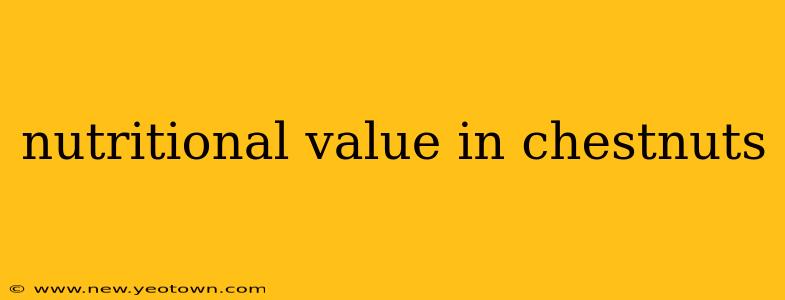Chestnuts. Those glossy, brown jewels of autumn, often relegated to holiday roasting pans or festive desserts. But hidden within their prickly shells lies a nutritional powerhouse waiting to be discovered. Far from being a mere seasonal treat, chestnuts offer a surprisingly diverse profile of vitamins, minerals, and antioxidants, making them a valuable addition to a healthy diet. Let's peel back the layers and explore the remarkable nutritional value packed within these often-underestimated nuts.
What are the main nutritional benefits of chestnuts?
The nutritional benefits of chestnuts are surprisingly extensive. Unlike many other nuts, chestnuts are relatively low in fat, especially saturated fat. They are also a good source of complex carbohydrates, providing sustained energy. This makes them a great alternative to refined carbohydrates like white bread or sugary snacks. Their richness in fiber aids digestion and promotes gut health, contributing to overall well-being. Furthermore, they’re a good source of several essential vitamins and minerals, including vitamin C, potassium, and manganese.
Are chestnuts a good source of protein?
While not as protein-packed as some other nuts like almonds or walnuts, chestnuts still contribute a decent amount of protein to your daily intake. They aren't a primary protein source, but they contribute to your overall protein needs, especially when combined with other protein-rich foods in a balanced meal. Think of them as a supporting player in your protein game rather than the star.
How many calories are in chestnuts?
The calorie count in chestnuts varies depending on the size and preparation method, but generally, a serving of about 100g of roasted chestnuts contains approximately 200 calories. While they are calorie-dense, this is comparable to many other nuts and is offset by their substantial nutritional value. The key is moderation, as with any calorie-dense food.
What vitamins and minerals are found in chestnuts?
Chestnuts are a treasure trove of essential vitamins and minerals. They're a good source of vitamin C, a powerful antioxidant crucial for immune function. They also contain notable amounts of potassium, an electrolyte essential for maintaining healthy blood pressure, and manganese, a mineral vital for bone health and metabolism. Other vitamins and minerals present in smaller but still significant quantities include vitamin B6, folate, and magnesium. This diverse nutrient profile contributes to overall health and well-being.
Are chestnuts good for weight loss?
The role of chestnuts in weight loss is a nuanced one. While they are calorie-dense, their high fiber content contributes to satiety, meaning you may feel fuller for longer after consuming them. This can be beneficial for weight management by reducing overall caloric intake. However, it’s crucial to incorporate them into a balanced diet and mindful eating plan, rather than relying on them as a magic weight-loss bullet. Overconsumption can still lead to weight gain, so moderation remains key.
How do I incorporate chestnuts into my diet?
The versatility of chestnuts allows for numerous culinary applications. You can enjoy them roasted, boiled, puréed into soups, added to salads, or incorporated into various baked goods. Their sweet and subtly nutty flavor pairs well with both savory and sweet dishes, offering endless possibilities for creative culinary exploration. From a simple roasted chestnut snack to an elaborate chestnut and mushroom risotto, the culinary possibilities are plentiful.
Conclusion: A Deliciously Nutritious Choice
Chestnuts, often overlooked as a simple holiday treat, deserve a place of honor in a healthy and balanced diet. Their unique nutritional profile, rich in complex carbohydrates, fiber, vitamins, and minerals, offers significant health benefits. While moderation is key with any calorie-dense food, incorporating chestnuts into your diet can provide a delicious and nutritious boost to your overall well-being. So next time you see those prickly brown shells, don't hesitate to embrace the nutritional bounty within.

